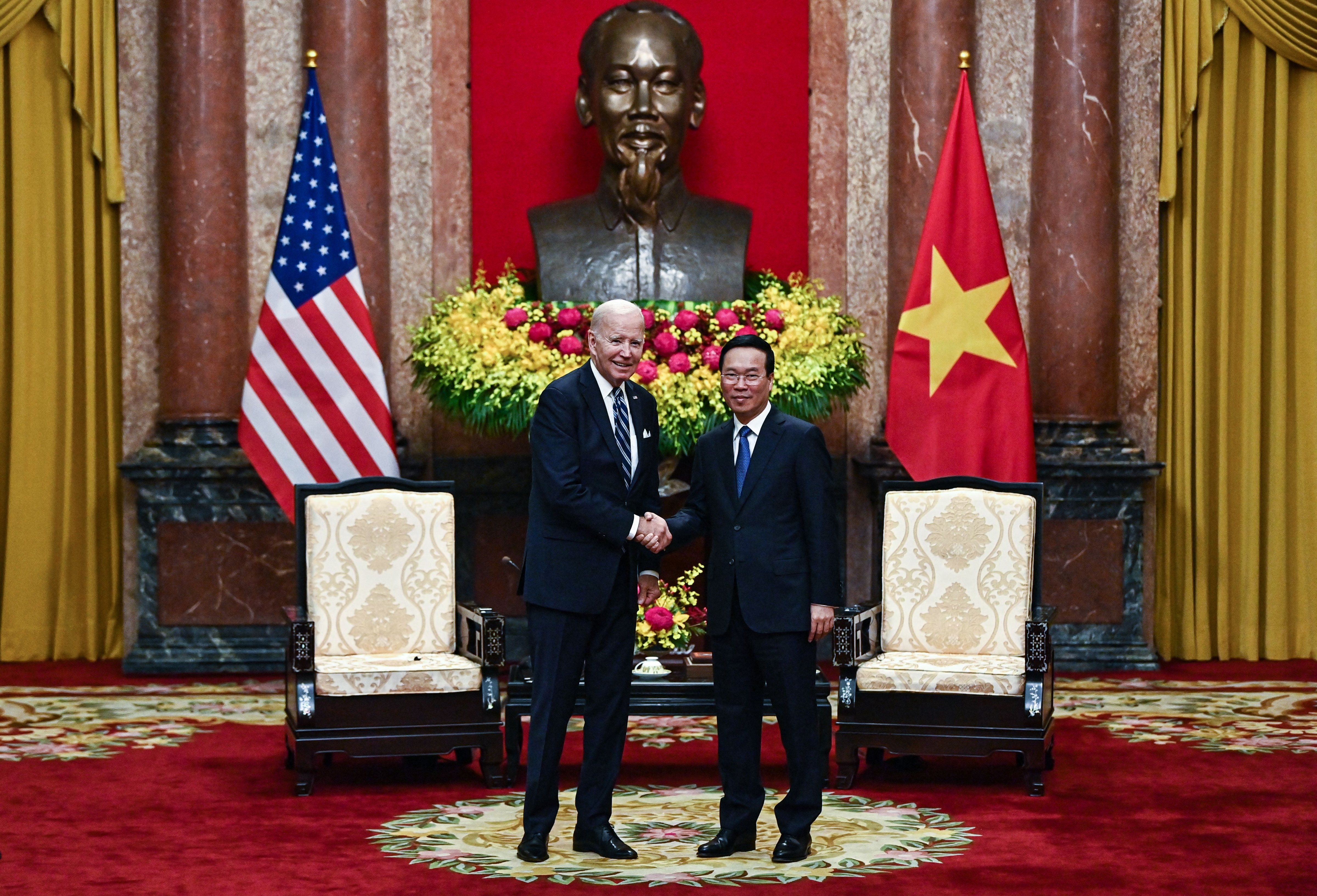Viet
ELITE MEMBER

- Joined
- Jun 18, 2012
- Messages
- 29,950
- Reaction score
- 0
- Country
- Location

U.S. President Joe Biden shakes hands with Vietnam's President Vo Van Thuong at the Presidential Palace in Hanoi on September 11.
Nhac Nguyen—AFP/ Getty Images
BY JOSH BOAK AND AAMER MADHANI / AP
SEPTEMBER 11, 2023 7:21 AM EDT
(HANOI, Vietnam) — President Joe Biden said Sunday his visit to Vietnam to showcase stronger ties with Hanoi was not about trying to start a “cold war” with China, but rather was part of a broader effort to provide global stability by building U.S. relationships throughout Asia at a time of tensions with Beijing.
“It's not about containing China,” Biden said at a news conference in Vietnam's capital after attending the Group of 20 summit in India. “It's about having a stable base.”
The American president came to Hanoi as Vietnam was elevating the United States to its highest diplomatic status, comprehensive strategic partner. That is evidence of how far the relationship has evolved from what Biden referred to as the “bitter past” of the Vietnam War.
The expanded partnership reflects a broader effort across Asia to counter China's influence. Biden has said Vietnam wants to flex a degree of independence, and U.S. companies are seeking an alternative to imports from Chinese factories. He is pursuing possible allies while also trying to soothe tensions with China.
“I think we think too much in ... cold war terms,” Biden said at his news conference. “It's not about that. It's about generating economic growth and stability in all parts of the world. And that's what we're trying to do.”
He added: “We have an opportunity to strengthen alliances around the world to maintain stability. That’s what this trip is all about.”
Biden opened his news conference by saying he had “traveled around the world in five days,” from Washington to New Delhi and now Hanoi, showcasing efforts by his administration to forge alliances. The president will stop in Alaska on the way home Monday to commemorate the anniversary of the 9/11 attacks.
In response to one question, Biden told reporters he had met with Chinese Premier Li Qiang while in India. The contact is the highest-level interaction between U.S. and Chinese officials since Biden and China's president, Xi Jinping, held talks at last year’s G20 in Indonesia. Xi skipped the India talks and sent Li in his place.
“We talked about stability. ... It wasn’t confrontational at all,” Biden said.
The exchange, between G20 sessions Saturday, was brief, according to a senior Biden administration official. It was not clear who approached whom, but Biden was interested in seeing Li and underscoring his desire to stabilize the up-and-down relationship between the two countries, said the official, who was not authorized to discuss the matter publicly and spoke on condition of anonymity.
Biden went into meetings with Vietnam's leaders after his arrival in the country. He welcomed the new partnership and said he hoped for progress on climate, the economy and other issues during his 24-hour stop in Hanoi.
“We can trace a 50-year arc of progress between our nations from conflict to normalization to this new elevated status,” Biden said with Nguyễn Phú Trong, general secretary of the Communist Party of Vietnam, at party headquarters.
Biden has described himself as being part of the “Vietnam generation” although he did not serve in a war. He was given five draft deferments and was exempted from military service because he had asthma as a teenager.
Biden called Vietnam “a friend, a reliable partner and a responsible member of the international community.” He noted that veterans such as John Kerry, his climate czar, and the late John McCain, a Vietnam POW and Republican senator from Arizona, found ways to build a relationship with Vietnam after the war.
“Both men saw so clearly, as I and so many others did, how much we had to gain by working together to overcome a bitter past,” he said.
Trong pledged that his country will work hard to implement the agreement. "Only then can we say it is a success,“ he pledged.
Biden described the U.S. and Vietnam as “critical partners at what I would argue is a very critical time.” Neither leader specifically discussed how China's economic and geopolitical rise had contributed to their countries' expanded partnership, yet it was hard to explain the mutual embrace without Beijing's growing influence.

U.S. Says Outreach to Vietnam Is for Global Stability
President Joe Biden said his visit to Vietnam was to build U.S. relationships throughout Asia and was "not about containing China.”
